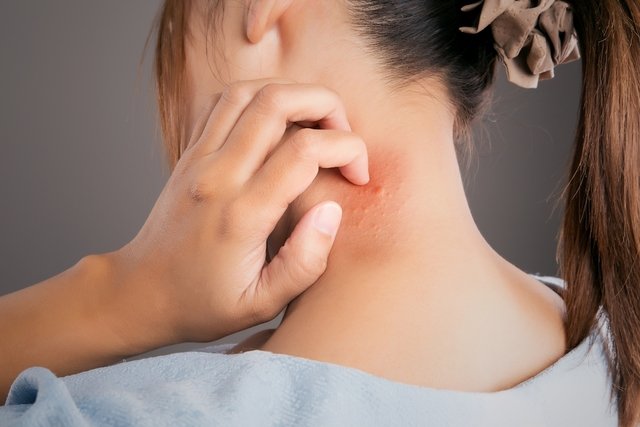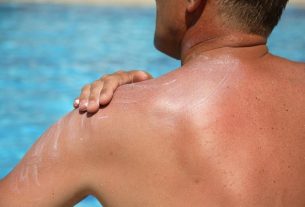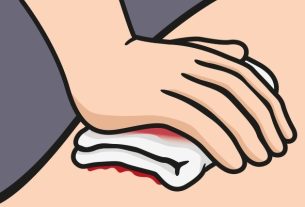A blackfly bite is normally not considered serious, causing mild symptoms such as minor swelling, redness and itching, which tend to improve within a few days.
However, although it is rare, there is a risk of the bite causing serious allergic reactions and transmitting infectious diseases such as onchocerciasis. Furthermore, sometimes the bite can also become infected, causing more redness, swelling and pain.
In the case of blackfly bites, especially when symptoms are intense or do not begin to improve after 24 hours, it is recommended to consult a general practitioner for an evaluation and initiation of treatment, and medications such as antihistamines and corticosteroids may be indicated.

Main symptoms
The main symptoms of a blackfly bite are:
- Small spot with blood on the skin;
- Redness around the bite site;
- Itchy skin in the affected area;
- Small swelling of the skin where the bite occurred.
A blackfly mosquito bite does not normally cause pain, however, some people experience a sensation of small stinging sensations. Furthermore, depending on the number of bites, symptoms such as itching, redness and swelling can quickly become more intense.
Symptoms generally improve within a few days even without specific treatment, however, they tend to worsen in the first 24 hours before starting to disappear.
Is a blackfly bite dangerous?
A blackfly bite is not normally dangerous, however, although it is rare, some people can develop more serious allergic reactions, such as anaphylaxis. In this case, other symptoms may appear, such as increased swelling in the skin, diarrhea or difficulty breathing. Understand better what anaphylaxis is and how to identify it.
Furthermore, the blackfly mosquito, like other types of mosquitoes, can also transmit diseases through their bites, such as onchocerciasis, which can cause symptoms such as intense itching of the skin, recurrent conjunctivitis and even loss of vision.
Inflamed blackfly bite
In some cases, a blackfly bite can become inflamed, with increased redness being noticed at the site of the bite, in addition to other symptoms such as fever, pus and worsening swelling.
If you suspect an infection, it is recommended to go to an emergency room for an evaluation. When the diagnosis is confirmed, antibiotics may be indicated, in the form of ointments, tablets and, in more serious cases, intravenously.
How the treatment is carried out
Normally, it is not necessary to carry out specific treatment, as the bite symptoms improve within a few days. However, it is recommended to keep the bite site clean and avoid scratching the skin to avoid causing wounds that could result in bite infection. Applying a cold compress to the area also helps reduce swelling, redness and itching.
In more intense cases, the doctor may recommend other measures to alleviate symptoms more quickly.
1. Ointments
Ointments containing corticosteroids, such as dexamethasone or hydrocortisone, may be indicated in the treatment of blackfly bites to alleviate symptoms such as itching and redness. Discover the main ointments recommended for insect bites.
2. Antiallergics
Medications with anti-allergic action, such as antihistamines and corticosteroids, may be indicated in cases where there is intense itching, as well as redness and swelling, to alleviate symptoms. See the most recommended medications for treating allergies.
How to prevent blackfly bites
To prevent blackfly bites, it is recommended:
- Use mosquito repellents in places at greater risk of bites, such as arms, legs and feet;
- Wear blouses with long sleeves and pants to cover areas of the body that are normally more exposed, such as arms and legs;
- Use screens and mosquito nets at homeon windows and on beds, for example;
- Avoid containers with standing watersuch as buckets, basins and swimming pools, close to the house;
- Do not leave doors and windows open all the timeto prevent mosquitoes from entering the house.
Additionally, there are homemade repellent options, such as some prepared with cloves or citronella, which have insecticidal properties and can be used to prevent bites. Discover the main options for homemade repellents.
Bibliography
- CDC. Prevent Mosquito Bites. Available at: <https://www.cdc.gov/mosquitoes/mosquito-bites/prevent-mosquito-bites.html>. Accessed on Nov 29, 2022
- STATPEARLS. Insect Bites. 2022. Available at: <https://www.ncbi.nlm.nih.gov/books/NBK537235/>. Accessed on Nov 29, 2022
- WILCOCK, Jane et al. Insect bites. BMJ. Vol.7. 370, 2020
- POOWUTTIKUL, Pavadee; SETH, Divya. Anaphylaxis in Children and Adolescents. Pediatr Clin North Am. Vol.66, n.5. 995-1005, 2019
- STATPEARLS. Onchocerciasis. 2022. Available at: <https://www.ncbi.nlm.nih.gov/books/NBK559027/>. Accessed on Nov 29, 2022
- MINISTRY OF HEALTH. Oncocercose. Available at: <https://www.gov.br/saude/pt-br/assuntos/saude-de-aaz/o/oncocercose>. Accessed on Nov 29, 2022
- STATPEARLS. Cellulitis. 2022. Available at: <https://www.ncbi.nlm.nih.gov/books/NBK549770/>. Accessed on Nov 29, 2022
- STATPEARLS. Mosquito Bites. 2022. Available at: <https://www.ncbi.nlm.nih.gov/books/NBK539915/>. Accessed on Nov 29, 2022
- JUCKETT, Gregory. Arthropod bites. Am Fam Physician. Vol.15, n.88. 841-847, 2013

Sign up for our newsletter and stay up to date with exclusive news
that can transform your routine!
Warning: Undefined array key "title" in /home/storelat/public_html/wp-content/plugins/link-whisper-premium/templates/frontend/related-posts.php on line 12
Warning: Undefined array key "title_tag" in /home/storelat/public_html/wp-content/plugins/link-whisper-premium/templates/frontend/related-posts.php on line 13



